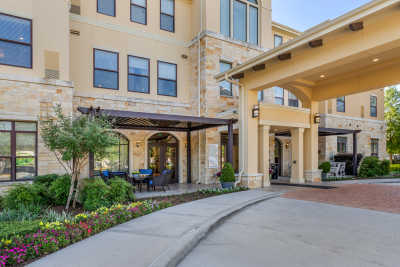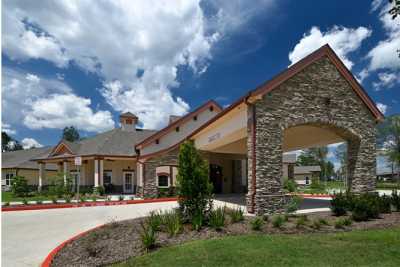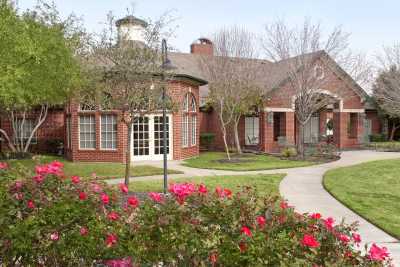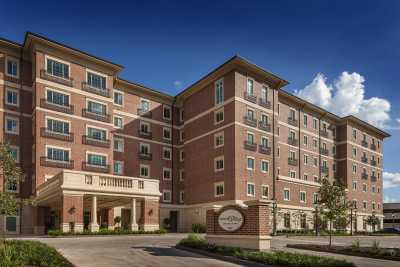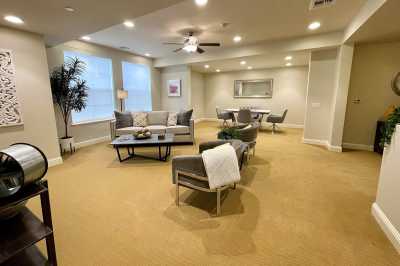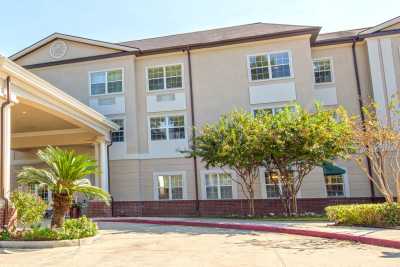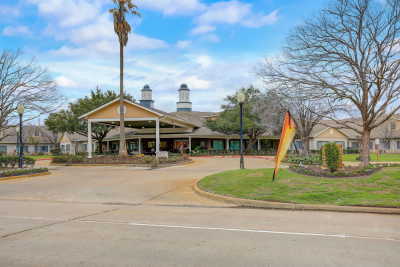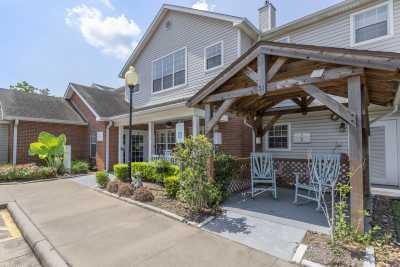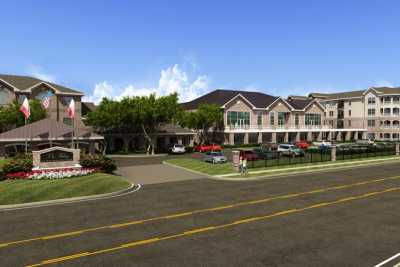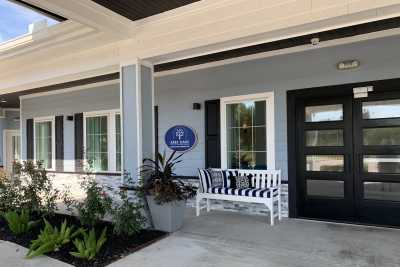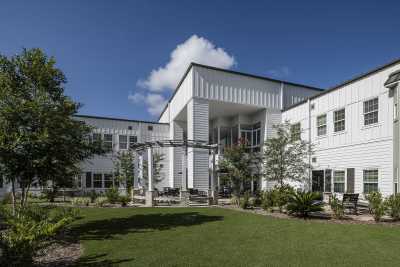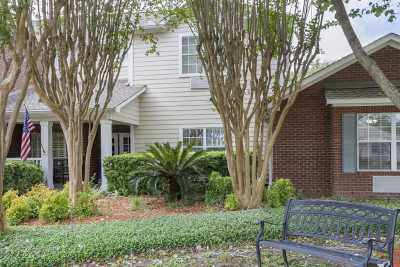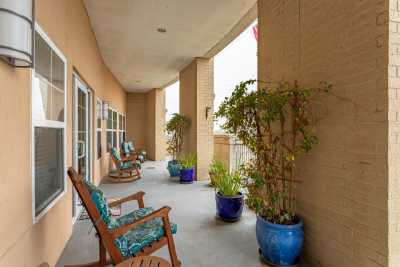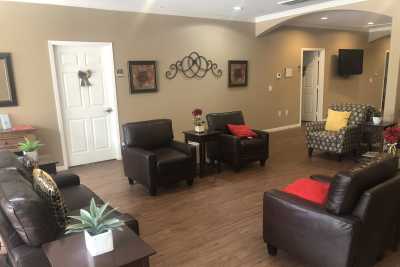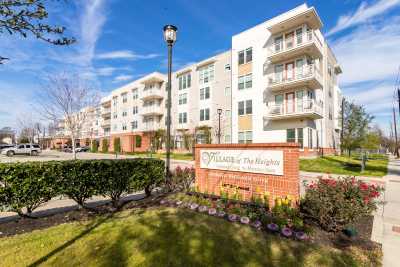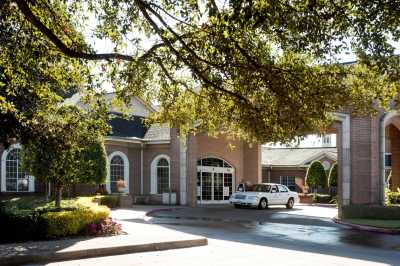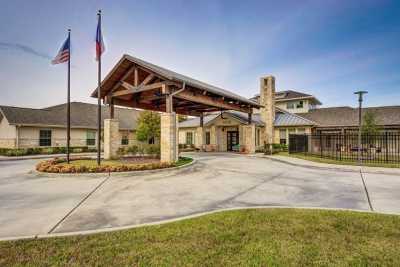
10 Best Nursing Homes in Houston, TX
Houston is the largest city in Texas, making it home to a variety of senior care options, including nursing homes, which is commonly used as a blanket term to refer to a breadth of senior living facilities. However, nursing homes are actually a specific type of facility that only provide skilled nursing care — the highest level of medical care available outside of a hospital. These skilled nursing homes or units are for individuals requiring 24-hour medical observation or rehabilitative services. If your loved one doesn’t require the 24/7 skilled nursing care provided in a nursing home or skilled nursing unit and only needs personal care services, they may instead benefit from an assisted living community.
Many assisted living and memory care communities also offer skilled nursing services on-site, in the event of resident illness, hospice, or recovery after a medical procedure. A Place for Mom partners with 35 assisted living and memory care facilities within a 10-mile radius of downtown Houston. These communities offer supportive services for seniors, including assistance with activities of daily living, medication reminders, dining plans, social programming, and other services to support continued health and well-being. This guide includes details on those partner communities as well as hyperlocal care resources specifically for Houston’s senior population.
Nursing Homes Facilities near Houston, TX
I will review Atria in 3 areas: the staff, the facility and the food. The staff has been wonderful. They are attentive and professional. They knew my wife's name on the first day. She was in need of more...
Response time to my mom's needs was #1 along with cleanliness. Their goal is responding within 5min. They track that daily. Activities are plentiful and my mom at 94.5 yrs does it all. Staff and...
I like the place but the company that owns the place is "cutting back" on things and I am WORRIED that they may not keep the place going.
We were happy with our experience. The staff went above and beyond to help us- even came to hospital to talk with our family member. Very professional and knowledgeable - and comfortable to be with during...
What we like the most about The Heritage of Clearlake is that the staff encourage the residents to participate in activities. They also have themed monthly family dinners
Everybody was so caring there. My dad had struggled so long with his disabilities as he refused any help at all in his old assisted living facility as it unfortunately was not run very well. The care staff...
My mother broke her hip and was kicked out the hospital very quickly. A neighbor moved to independent living at The Buckingham, but we didn't know they have rehab after injury. She went in weak never...
Toured community looking for grandmother. Management went out their way to speak to me and made me feel welcome. Would definitely recommend. unfortunately my passed away.
The staff in the Morada Cy-Fair Senior Living Memory Care Neighborhood are all competent, friendly, compassionate, professional and knowledgeable. I feel like they listen to me and take my concerns and...
Our free advisors can help
- Compare local facilities
- Determine care type
- Schedule tours
- Evaluate pricing
It is apparent they genuinely care about their residents. They strive to meet all of their needs: physical, emotional, and social. Offering options for most meals would be helpful.
It (nor any similar business) is not perfect, but they do appear to genuinely care about the residents. Based off of our experience, I would recommend them to others looking.
The Abbey at Westminster is such a welcoming community. Every one from the front desk restaurant personel and sales/office staff have a very caring attitude. They have cultivated a caring environment.
We are very pleased with Apex as a memory care facility. The administration and staff are professional, skilled, knowledgeable, dedicated, and friendly.
The staff has been amazing Only thing is that memory care could use more staff. The Oaks needs to have more engaging activities for those that are mobile. Again this appears to be a staffing issue. It is...
The staff seemed very caring. The location was near my sister's house. They had a bed / room available immediately. Dad and I were already living in a Brookdale community in town so it was an easy transfer.
I give a 5 for all now but in the beginning it was quite confusing regarding medication administration. They kept messing up and could have potentially caused a medical emergency. We visit each week and the...
My loved one is currently a resident at Brookdale Champions and her experience has been great so far. The staff and care services are great. The cleanliness and friendliness are also great. Anytime that we...
5 across the board for Braeswood Estates. The leadership was amazing - the executive director knows every resident, and the nursing director was amazing.
First of all let me just say well done to all the recruiters at this place. The staff here is so amazing. They make the residents feel like family. So for this I truly thank you. I’ve heard wonderful things...
Rooms are nicely sized. It's not a very big place, but this means that the staff to resident ratio is excellent. I visit my mom every week and she is always clean, fed, and seems to generally be very well...
I don’t often take the time to write about the good things but in this case I wanted to share our great experience. My dad was very lonely after mom passed and was isolated at home. He was resistant to move...
Great location, great staff, great facilities, nice accommodations. Apartment sizes and layouts are great. They do need more help in kitchen and dining area and more variety on the menu.
My mother ended up recovering and returning to her home, but she made good friends and my sisters and I felt very safe having her at Parkway Place while she recovered.
My sister is doing great at Auberge! My family and I made the right choice for her!...Thank you staff and Liam for all your support!!! We hope [name removed] will continue to do well at her new home. [name...
Our methodology
How we rank order the Houston community options above
We developed a proprietary recommendation system that orders Houston community options based on factors we know are important to seniors and their families:
- Proximity to your search location
- Availability of recent, high-quality reviews
- The amount of detailed community information available
Where we source our information
14,000+ communities
We collect proprietary data from our network of 14,000+ senior living communities in the U.S., with regular refreshes of data and information
350,000+ reviews
We have 387,000+ reviews from senior living residents and family members that provide first-hand accounts about senior living communities
- Costs of nursing homes in the Houston area
- What families are saying about nursing homes in Houston
- How people pay for a nursing home or skilled nursing care in Houston
- Understand Texas laws and regulations for nursing homes and senior care facilities
- Houston has a robust senior living scene with unique features
- Houston nursing homes services and amenities
- Explore senior care with confidence
- Unfamiliar with Houston? Highlights for seniors
Costs of nursing homes in the Houston area
Houston nursing homes or skilled nursing facilities typically have increased costs due to the higher level of medical observation residents receive. However, pricing can still vary based on location, provided services, and your loved one’s specific care needs. Additionally, if your senior loved one doesn’t require 24-hour skilled nursing care, you can save a significant amount of money by opting for an assisted living or memory care facility — where they’ll still receive care services, like assistance with activities of daily living, medication management, and some basic skilled nursing services.
Take a look at the average costs of Houston nursing homes versus assisted living and memory care communities:
Nursing homes
- Semi-private room: $5,262
- Private room: $7,756 [01]
Assisted living communities
- Semi-private room: $3,175
- Private room: $4,461 [02]
Memory care communities
- Semi-private room: $4,740
- Private room: $5,762 [02]
Average monthly cost of Nursing Homes in Houston, TX vs. nearby cities
Average monthly cost of Nursing Homes in Houston, TX vs. the state and national average
Average monthly cost of Nursing Homes in Houston vs. other types of senior living
Median monthly costs of Nursing Homes in Houston, TX by room type
What families are saying about nursing homes in Houston
Recent reviews for nursing homes in Houston
The Tradition - Woodway in Houston, TX
Good Living Community Care in Houston, TX
Serenity Gardens Friendswood
How people pay for a nursing home or skilled nursing care in Houston
Seniors and families can pay for Houston nursing homes and senior care facilities using a combination of private pay methods and public pay options. Below, you’ll find several options and resources to help you understand how to pay for nursing home and senior care facilities.
Private pay methods will depend on your loved one’s income sources. Sources may include a combination of investment returns, Social Security benefits, pensions, and savings accounts. Other options may include the following:
- Selling a house. If your loved one is planning a move to a senior care facility, they may be looking to sell their house. Freed up cash from the sale could help fund their nursing home or senior living expenses.
- Reverse mortgage. If selling a house isn’t an option, a reverse mortgage might prove useful, as it enables your loved one to borrow a loan from their home’s equity to fund senior care costs.
- Health savings accounts. If your loved one was ever enrolled in a health savings account (HSA) program through their employer, they may use those funds to cover qualifying medical expenses, reducing the burden of senior care or nursing home costs.
- Life insurance. Your loved one could sell, surrender, or borrow from their life insurance policy to help cover nursing home or senior living expenses. Check with the policy provider to learn about such options.
- Long-term care insurance. If your loved one has long-term care insurance, they can use it to fund senior care services. Long-term care insurance policies vary in what they can cover, so it’s best practice to consult with your loved one’s provider to learn more.
Note: Texas is one of the few U.S. states without personal income tax, saving seniors from paying taxes on their Social Security benefits and other retirement income.[03,04]
Houston is in Harris County, which is known for having the highest veteran population in Texas. To advise and assist this large number of veterans, Houston offers a number of veterans programs, services, and clinics. The city even has a VA nursing home — Richard A. Anderson Texas State Veterans Home — for qualifying veterans to receive affordable, long-term skilled nursing care within an environment designed to accommodate their unique needs.
If a veteran qualifies for a VA pension, they can use those funds to pay for a senior care facility of their choice. Senior and/or disabled veterans that are enrolled in VA health care may also qualify for the Aid and Attendance benefit, which provides additional funds that can be used to defray senior living costs. The following local resources serve Houston’s veteran population and can help your loved one access their eligible benefits.
Number of veterans who live in Houston, according to the U.S. Census Bureau
Percentage of Houston veterans age 65+, according to the U.S. Census Bureau
Resources for Houston veterans
The Harris County Veterans Services Department advocates for veterans and their families by offering assistance with compensation, pension, medical, educational, insurance, and burial benefits.
2929 McKinney St.
Houston, TX 77003
Phone: 281-876-6600
Email: vsdinfo@harriscountytx.gov
Veterans Affairs Houston Regional Office website
6900 Almeda Road
Houston, TX 77030
Hours: Monday through Friday, 7:30 a.m. – 4 p.m.
Amazing Soldiers, Inc. is a Houston nonprofit dedicated to providing resources and reliable services to veterans in need of support or assistance.
3880 Greenhouse Road, Suite 409
Houston, TX 77084
Phone: 346-900-4551
Email: amazingsoldiers16@gmail.com
The Texas Veterans Commission advocates for Texas veterans and their families and surviving spouses. They offer eight programs dedicated to helping veterans obtain benefits, file claims, and more.
Medicaid is a joint state and federal program that provides health insurance to individuals with limited income and resources. The Texas Health and Human Services Commission (also known as the HHSC or HHS) is the agency that runs the state’s Medicaid programs. The HHSC offers a number of programs through their local area agencies on aging (also known as AAAs) for seniors 60+, as well as other long-term care programs for low-income seniors. Texas also offers specific Medicaid programs for disabled seniors.
Houston seniors with Medicaid typically receive their coverage through the STAR+PLUS managed care program for 65+ adults and individuals with disabilities. The STAR+PLUS program covers some basic health care services and some skilled nursing services through agencies that have been licensed and certified by Texas Health and Human Services. To receive Medicaid within a nursing facility, residents must have an approved medical necessity, confirming that full-time services are required from a licensed nurse within a nursing facility.
Home and Community Based Services (HCBS) waiver
If your loved one requires medically necessary care but would prefer to stay out of an institutional, stand-alone nursing home or skilled nursing unit, they may benefit from Medicaid’s Home and Community Based Services (or HCBS) waiver program. This waiver program can be used to pay for home health care services in the senior’s place of residence. The place of residence can include assisted living and memory care facilities as long as the facility is contracted by a Medicaid-managed care provider. This enables seniors to receive care within a setting of their choice, as opposed to an institutional setting. Texas Health and Human Services assesses an individual’s need for the HCBS program when they apply for Medicaid.
The Home and Community Based Services (or HCBS) waiver program can help cover the following:
- Personal home care
- Medical supplies
- Dental services
- Adaptive aids, such as eyeglasses, hearing aids, orthotic devices, and orthopedic shoes
- Nursing services
- Respite care
- Cognitive rehabilitation therapy
- Physical, occupational, and speech therapies [05]
To qualify for the Home and Community Based Services waiver, seniors must meet the following requirements:
- Be 65 years of age or older
- Require an institutional level of medical care, like that found in a nursing home
- Have a monthly income of less than $2,523 individually or $5,046 as a couple [06]
Note: Not all Houston senior living facilities qualify as an HCBS setting under Medicaid. Qualifying facilities must be integrated into a greater community and provide opportunities for interested residents to seek work or volunteer, engage in local community life, control their personal resources, and receive services within the community. Check with your prospective community if you plan to use Medicaid to pay for care services.
There are many Medicaid resources throughout Houston. Below, you’ll find a few websites that can connect you to nearby offices for assistance with Medicaid applications and services. You’ll also find FAQs and an online application form.
Houston resident Medicaid resources
The Your Texas Benefits search tool and the HHSC services search tool can help you find an HHSC Medicaid benefits office near you.
You can apply for Medicaid online through the Your Texas Benefits website.
Find answers to questions about your Medicaid benefits.
Medicare is a federal health insurance program for adults 65+ and individuals with disabilities. It covers skilled nursing care costs for a limited time. In the state of Texas, Medicare may fully cover up to 20 days in a nursing home or skilled nursing facility and partially cover up to 100 days. After the 100-day limit, Medicare is no longer responsible for any payments.[07]
If your loved one doesn’t require a nursing home level of medical care, Medicare will only help cover some associated medical care costs. The following programs can help your loved one save on Medicare costs and help them apply for benefits:
- The Texas Medicare Savings Program helps cover some Medicare Parts A and B deductibles, premiums, copayments, and/or coinsurance. Part A covers hospital stays, care in a skilled nursing home, hospice care, and some home health care services, while Part B covers certain doctors’ services, outpatient care, medical supplies, and preventive services. Seniors must meet certain income requirements to qualify for this program.
- Kidney Health Care is a Texas program that covers costs for some treatments, surgeries, medicines, and premiums for individuals with end-stage renal disease.
- Texas Health Information, Counseling, and Advocacy Program (also known as HICAP) offers legal advice, referrals, and assistance to Texans who are 60+ and eligible for Medicare.
Below, you’ll find Houston Medicare resources, including local agencies, applications, and more, to help you learn about benefits and apply for them.
Houston resident Medicare resources
You can apply for Medicare benefits through the Social Security Administration website.
This Medicare Savings Program PDF gives you the application as well as directions on how to apply. You can print the PDF or request a paper form by mail.
Use this Social Security Office Locator to find your local Social Security office in Houston.
A local long-term care ombudsman advocates for residents’ rights in assisted living, memory care, and skilled nursing facilities, in addition to helping families learn about their senior care options and payment methods.
Greg Shelley, Harris County Long-Term Care Ombudsman
6901 Bertner Ave., Suite 624
Houston, TX 77030
Phone: 715-500-9930
Email: Gregory.K.Shelley@uth.tmc.edu
The Harris County Area Agency on Aging is a part of the nationwide Aging Network, and it coordinates support services for adults 60+ and their caregivers.
Phone: 832-393-4301
Email: aging@houstontx.gov
Texas enables its Medicare- and Medicaid-qualifying residents to receive dual coverage through one joint Medicare-Medicaid Plan (MMP) called the Dual Eligible Integrated Care Demonstration Project, commonly referred to as “the Demonstration.” With the Demonstration, the state of Texas aims to improve service coordination, enhance quality of care, eliminate cost shifting between Medicare and Medicaid, and reduce costs for the state and federal government.
To qualify for the Demonstration, seniors must meet the following eligibility requirements:
- Have Medicare Parts A, B, and D, and receive full Medicaid benefits
- Be enrolled in Texas’ STAR+PLUS program for at least 30 days
If your loved one qualifies for dual coverage, they should be automatically enrolled and may choose to opt out of the Demonstration after they’ve been notified through a letter in the mail. For additional information on the Demonstration, you can email Managed_Care_Initiatives@hhsc.state.tx.us.
Understand Texas laws and regulations for nursing homes and senior care facilities
In the state of Texas, all assisted living, memory care, and skilled nursing homes must be licensed and regulated by the Texas Health and Human Services Commission (also known as the HHSC or HHS) before providing housing and care services to residents. Additionally, if a nursing home or senior care facility wishes to accept Medicaid or Medicare, it must be certified to do so by the HHSC. Below, you’ll find a summarized list of HHSC certification requirements for nursing homes and senior care facilities in Texas:
Resident admission processes
- Using a doctor’s order, skilled nursing facilities must develop a person-centered care plan for each resident, and it must encompass the patient’s dietary, therapeutic, social, psychological, and daily care needs.[08,09]
- In assisted living and memory care facilities, a similar procedure must be followed, except the facility is not required to use a doctor’s order for care plans. For memory care facilities, there must also be a specialized admissions process in place to identify a resident’s need for memory care services.[10]
Management and staffing requirements
- Texas nursing homes and skilled nursing units are required to have licensed and registered nurses, certified nursing assistants, and nurse aids on staff. All nursing facilities must also meet specific staff-to-resident ratios (one on-site nurse for every 20 residents at all times).[11]
- Assisted living facilities require a full-time manager on-site to oversee the facility’s daily operation. These managers are required to complete at least one 24-hour assisted living management course along with their staff.[12]
- Memory care facility managers and staff members must continually participate in specialized memory care training in order to remain a licensed memory care facility.[13,14]
Safety and healthy environmental standards
- A certified skilled nursing facility in Texas must meet design, construction, and equipment standards that support the health and safety of residents, staff, and visitors. Each nursing facility must have safety equipment and emergency protocols for accidents, fires, or power outages.[15]
- Both assisted living and memory care facilities are required to have similar provisions and protocols in place. Memory care facilities must have additional measures in place to prevent residents from harming themselves or wandering. All facilities must allow for safe access to fresh air and common areas for activities.[16]
- Memory care facilities must designate an activities director to encourage socialization among residents. It’s required for the director to tailor activities based on each individual resident’s abilities. Directors must also arrange for special equipment in order to ensure that all residents can participate in activities.[17]
Nursing home and senior living facility inspections
Texas Health and Human Services performs inspections on all skilled nursing, assisted living, and memory care facilities. These inspections are done approximately every two years and check for a facility’s compliance with the life safety code, physical plant requirements, and health code requirements.[18] The health code and life safety code include a survey of the following in nursing homes and senior care facilities:
- Adequate staff-to-resident ratios
- Employee background checks
- Management of the facility
- General construction of the facility
- Safety and emergency features
- Protection from hazardous areas
- Documentation of fire drills, system checks, etc. [18]
Families can access a licensed community’s most recent inspection report and general facility information through the Texas Health and Human Services Long-term Care Provider Search. You can also email RSLTCR.RecordsMgmt@hhsc.state.tx.us to request any information not found on the site.
Nursing home reviews
In an effort to continually enhance the quality of care provided in Texas nursing homes, the Texas Health and Human Services Commission implemented a new Quality Monitoring Program (QMP) to monitor nursing facilities with a history of resident-care deficiencies. These QMPs are conducted by nurses, pharmacists, and dieticians. During their inspections, they may recommend the following:
- Changes to a facility’s policies or procedures
- The facility’s need for technical assistance
- Staff trainings and education on evidence-based best practices
Another inspection effort, called the Nursing Facility Quality Review, was spearheaded by the former Department of Aging and Disability Services and the University of Texas at Austin School of Nursing. These reviews were conducted every few years to identify problem areas and provide solutions in Medicaid-certified nursing facilities across the state. The primary goal was to assess clinical topics related to resident care, review medication management, and evaluate residents’ satisfaction with quality of care and quality of life within the facility. The most recent available report was published by the HHSC in 2017.
Families can also visit the federal Medicare website to compare and contrast ratings, staffing practices, and overall quality of Medicare- and Medicaid-certified nursing homes.
Texas Health and Human Services Commission (HHS or HHSC) contact information
4601 W. Guadalupe St.
Austin, TX 78751
Phone: 512-424-6500
Hours: Monday through Friday, 8 a.m. – 5 p.m.
COVID-19 regulations for Houston nursing homes
Houston senior care facilities are required to develop their own policies and procedures for COVID-19 infection control practices — including masking, social distancing, and protocols for the use of additional personal protective equipment (PPE). Texas Health and Human Services provides a nursing facility COVID-19 response plan to keep nursing facilities safe. Here are some of those COVID-19 guidelines in place for Texas senior care facilities:

Vaccinations. COVID-19 vaccines aren’t mandatory for residents or visitors.

Masking. Visitors, staff, and residents aren’t required to wear masks unless indicated in the facility’s infection control policies and procedures.

Facility cleanliness. Surfaces must be disinfected often, alcohol-based hand sanitizers must be made available in common areas, and sinks must be well-stocked with soap and paper towels.

Staff safety. Staff must wear personal protective equipment when necessary and follow infection control policies and procedures during an outbreak.

CDC guidelines. Screen visitors and staff for a positive COVID-19 test result and symptoms when necessary. Develop an infection prevention and control program to prevent the spread of infection.

Social distancing. Resident visitors are allowed on-site, as it’s a Texas resident’s right, however, they must follow social distancing guidelines set forth by the facility.
Houston has a robust senior living scene with unique features
As a home to over 270,000 seniors, Houston is home to the largest senior population in Texas. The senior population has grown by over 40% within the last 10 years and is projected to continue increasing. To accommodate the aging population, the senior living scene has evolved to include a variety of options dedicated to addressing the modern senior’s unique needs. Read on for an overview of some unique senior living features in Houston.
Flexible, round-the-clock care
All of our partnered Houston assisted living and memory care facilities provide 24-hour supervision to ensure residents’ needs, premeditated and unprecedented, are met.[02] A majority of communities have an on-call doctor and visiting health care professionals — including dentists, nurses, podiatrists, and rehabilitation therapists. Note, that these visits are covered by Medicare only when deemed medically necessary. All of our partner assisted living communities offer some on-site nursing services, like medication management, hospice care, and medical rehabilitation. Meaning, a resident can receive skilled nursing care from the comfort of their own room or apartment in the community, if ever required.
Engaging activities and amenities
Over a third of our partners have an activity director on-site to help keep residents active.[19] These directors create a calendar of activities filled with fitness classes, social events, brain games, and other events catered to residents’ interests. All of our partner senior care facilities enable residents to enjoy community amenities at their leisure. On-site amenities of our partner Houston senior care communities often include the following:
- Fitness centers and pools
- Courtyards with raised gardens, BBQ areas, and walking paths
- Bistros, lounges, and bars
- Game rooms and common areas
- Movie rooms
- Business centers
- Libraries
Additionally, seniors looking for off-site activities and other services can benefit from the concierge services available at many of our partnering communities.
Safety and security measures
To help ensure resident safety, many of our partnering senior care facilities in Houston take extensive security measures. Several communities offer enclosed courtyards, secure walking paths, clearly marked exits, directional signs, and other supportive safety features. Senior care facilities also monitor entrances and exits, have 24-hour surveillance, and take a variety of other security measures. Some of these facilities are even designed to accommodate residents with Alzheimer’s or other forms of dementia and include specialized security features, like wander prevention systems and resident call systems.
Houston nursing homes services and amenities
Availability of select care services in Houston nursing homes
Availability of select dementia care services in Houston nursing homes
Availability of select dietary accommodations in Houston nursing homes
Availability of select dining options in Houston nursing homes
Availability of select programs and activities in Houston nursing homes
Explore senior care with confidence
Know where to start.
Identify the right care for your loved one with our free assessment.

See what you can afford.
Understand cost and payment for long-term care based on your loved one's needs.

Find top facilities for you.
Free, personalized guidance from our Senior Living Advisors can help you narrow your search.

Tour your favorite facilities.
Our free touring checklist can help you choose the right community.
Unfamiliar with Houston? Highlights for seniors
Number of seniors over the age of 65 currently living in Houston, according to the U.S. Census Bureau
Percentage of Houston seniors 65 and older who aren’t currently in the workforce, according to the U.S. Census Bureau
Median annual retirement income for Houston seniors 65 and older, according to the U.S. Census Bureau
Health care for seniors in Houston
When it comes to health care, Houston seniors are in luck. The city offers a wealth of health care options throughout the city. Houston houses the nation’s top cancer center, top state hospital, and two nationally ranked hospitals.

Houston Methodist Hospital
Houston Methodist Hospital is the No. 1 hospital in the state of Texas and Houston, according to U.S. News and World Report. It nationally ranks in 10 specialties, including No. 22 for geriatrics, No. 15 for neurology, and No. 11 for orthopedics.

Baylor St. Luke’s Medical Center
Baylor St. Luke’s Medical Center is the No.2 hospital in Houston, according to U.S. News and World Report. It nationally ranks in six specialties, including No. 43 in geriatrics.

MD Anderson Cancer Center
MD Anderson is the No. 1 cancer center in the country, according to U.S. News and World Report. It’s the largest cancer center in the U.S. and is nationally ranked in geriatrics, diabetes, and urology.

Michael E. DeBakey VA Medical Center
Michael E. DeBakey is one of the most popular veteran hospitals in Texas. It is known for providing a wide range of health, legal, and caregiver services.
Transportation for seniors in Houston
Public transportation is often the least favored option among senior residents in senior care facilities, as it isn’t the most practical option in Houston. As a safe alternative, 87% of our partner senior care facilities — namely, assisted living and memory care facilities — provide complimentary or at-cost transportation options to and from medical appointments, errands, and some off-site activities.
If a facility doesn’t offer transportation options, seniors on the more independent side may consider using the local RIDES program. This program is for qualifying Harris County residents, meaning 65+ adults or individuals with disabilities who cannot access public transportation options through METRO — Harris County’s public transit system.

Senior activities in Houston
Houston has become a cultural melting pot in the South, making it home to an abundance of shops, restaurants, and activities. Luckily, Houston offers a range of activities for seniors of all mobility levels. Many senior living facilities will even arrange group outings to nearby parks, museums, restaurants, and other places of interest to residents.
- Many of Houston’s museums are wheelchair-friendly, like the famous Space Center Houston, Houston Museum of Natural Science, and the Museum of Fine Arts, Houston (MFAH). The MFAH even offers Looking Together — a free program designed to help individuals with dementia connect.
- For seniors who enjoy the performing arts, attending a beloved show at one of Houston’s many performing arts theaters might be fitting. The Theater District spans more than 15 blocks and hosts a myriad of concerts, ballets, symphonies, and plays.
- For the outdoorsy seniors, the wheelchair-friendly Houston Zoo and Houston Botanic Garden host a dynamic world of creatures and plants. Plus, the Houston Parks and Rec Department maintains several parks, trails, golf courses, tennis courts, and pickleball courts throughout the city.
Frequently Asked Questions
Cinco Ranch Alzheimer's Special Care Center, Atria Westchase and The Solana Vintage Park are the top-rated Nursing Homes facilities near Houston, TX. These Nursing Homes facilities received the highest rankings based on verified family reviews. See full list of communities.
The average cost of Nursing Homes in Houston is $4,904 per month. This cost may vary based on location, amenities, floorplan, level of care and other factors.
References
Genworth. (2021). Cost of care survey.
A Place for Mom. (2022). A Place for Mom proprietary data.
TurboTax. (2022, December 1). States with the lowest taxes and the highest taxes.
Fritts, J. (2020, August 9). Does your state tax social security benefits? Tax Foundation.
Texas Health and Human Services. (2022). STAR+PLUS, STAR+PLUS Client FAQs.
Texas Health and Human Services. (2016, March 1). A-3300, Home and Community-Based Services waiver programs. Medicaid for the Elderly and People with Disabilities Handbook.
Texas Health and Human Services. (2022). H-7000, Medicare and co-payment. Medicaid for the Elderly and People with Disabilities Handbook.
Nursing Facility Requirements for Licensure and Medicaid Certification, Texas Administrative Code § 554.801 (1999 & rev. 2020).
Licensing Standards for Assisted Living Facilities, Texas Administrative Code § 553.259 (2021).
Licensing Standards for Assisted Living Facilities, Texas Administrative Code § 553.307 (2021).
Nursing Facility Requirements for Licensure and Medicaid Certification, Texas Administrative Code § 554.1001 (1995 & rev. 2022).
Licensing Standards for Assisted Living Facilities, Texas Administrative Code § 553.253 (2021).
Licensing Standards for Assisted Living Facilities, Texas Administrative Code § 553.301 (2021).
Licensing Standards for Assisted Living Facilities, Texas Administrative Code § 553.303 (2021).
Nursing Facility Requirements for Licensure and Medicaid Certification, Texas Administrative Code § 554.1701 (1996 & rev. 2021).
Nursing Facility Requirements for Licensure and Medicaid Certification, Texas Administrative Code § 554.2208 (1995 & rev. 2020).
Licensing Standards for Assisted Living Facilities, Texas Administrative Code § 553.309 (2021).
Assisted Living Facility Licensing Act, Health Facilities § 247.001 (1991 & rev. 1999).
Texas Health and Human Services. (2022, July 27). Screening of staff and visitors entering nursing facilities to continue.
United States Census Bureau. (2021). Population 65 years and over in the United States (S0103) [Data Set]. American Community Survey.
United States Census Bureau. (2021). Veteran status (S2101) [Data Set]. American Community Survey.

More questions?
Ask an A Place for Mom local advisor at no cost.
- Heakers, Texas
- Bellaire West, Texas
- Heaker, Texas
- Alief, Texas
- Louetta, Texas
- Spring Valley, Texas
- Spring Valley Village, Texas
- Hedwig Village, Texas
- Kohrville, Texas
- Hilshire Village, Texas
- Piney Point Village, Texas
- Bunker Hill Village, Texas
- Meadows Place, Texas
- Addicks, Texas
- Bellaire, Texas
- Mission Bend, Texas
- Four Corners, Texas
- Klein, Texas
- Southside Place, Texas
- Hunters Creek Village, Texas



